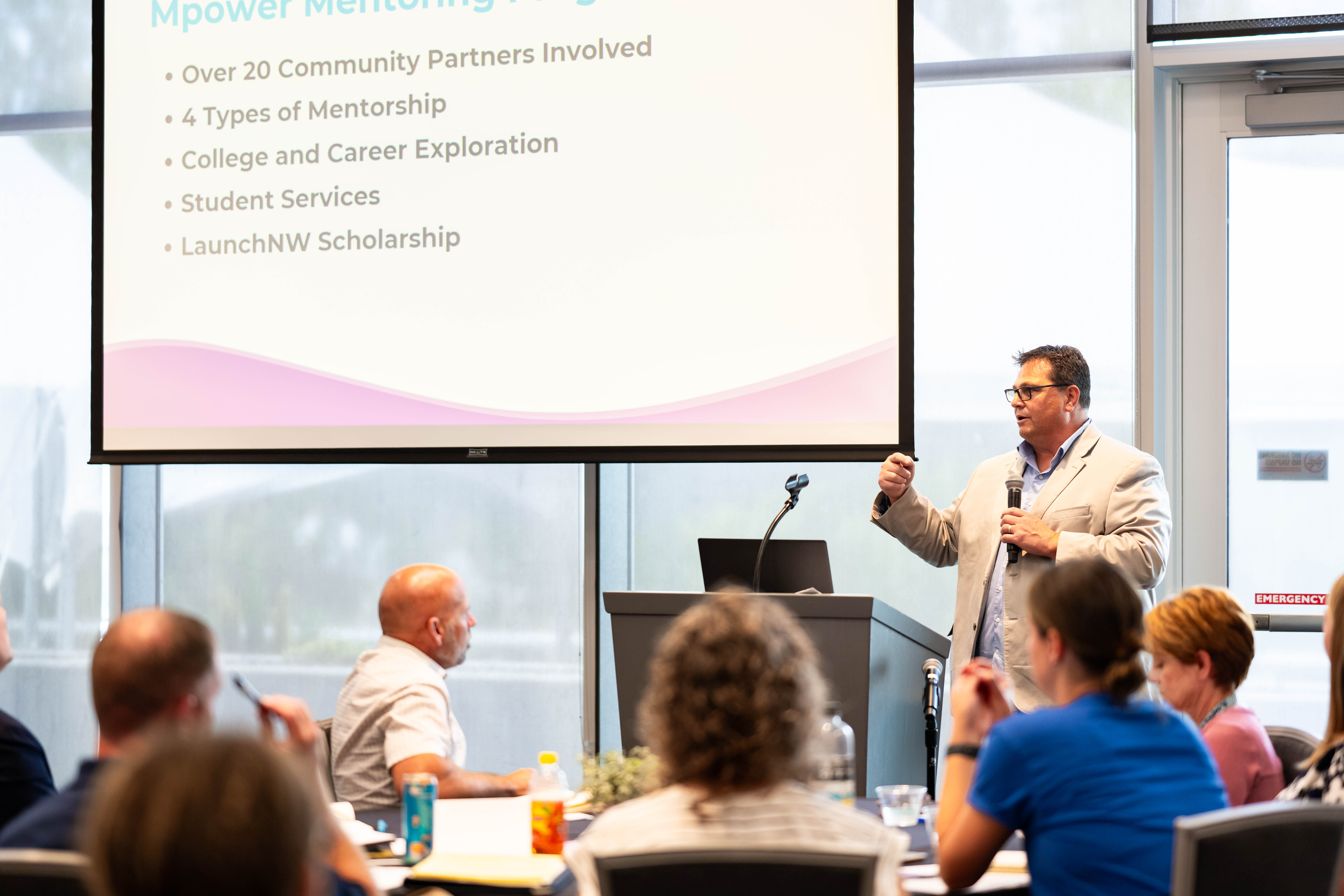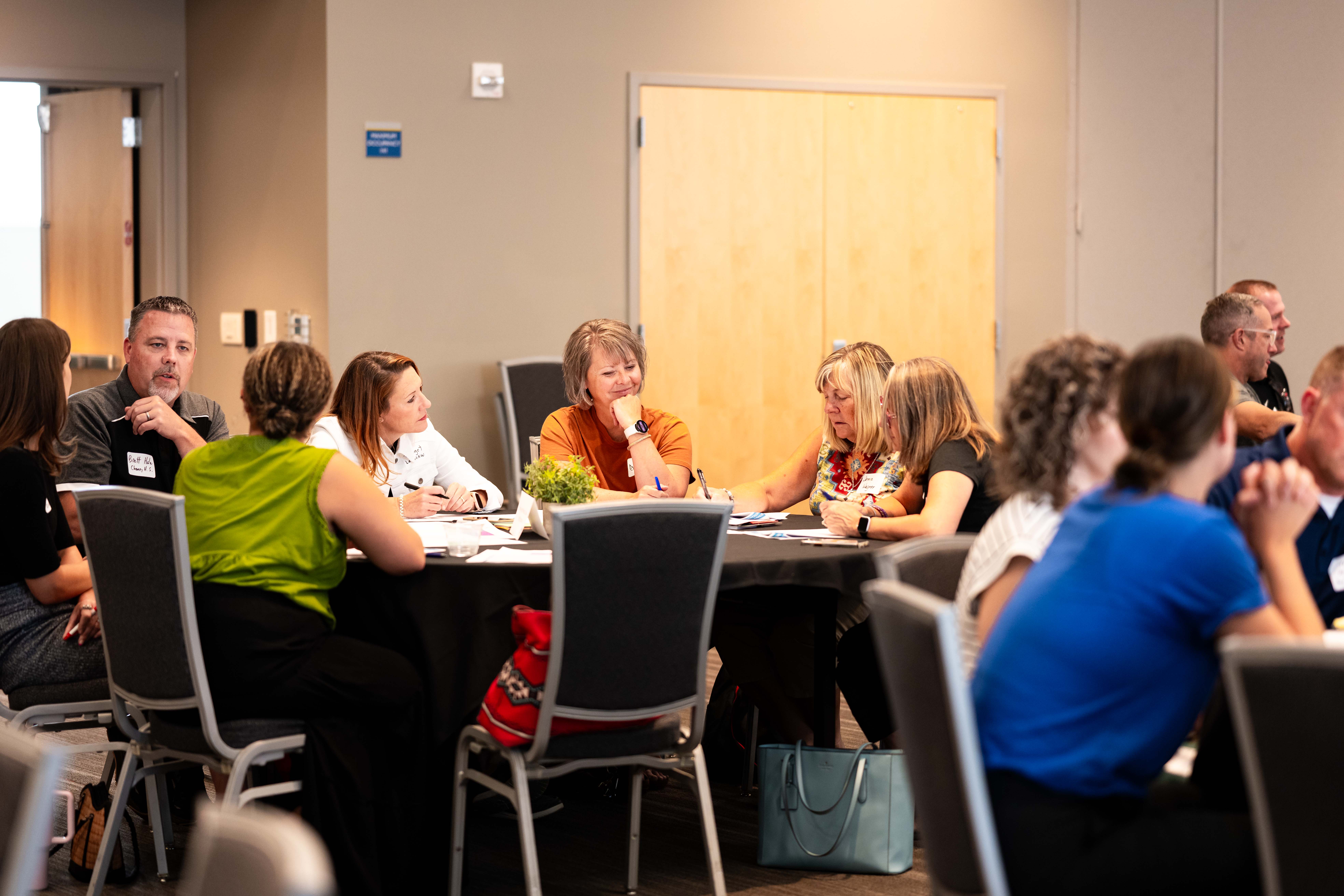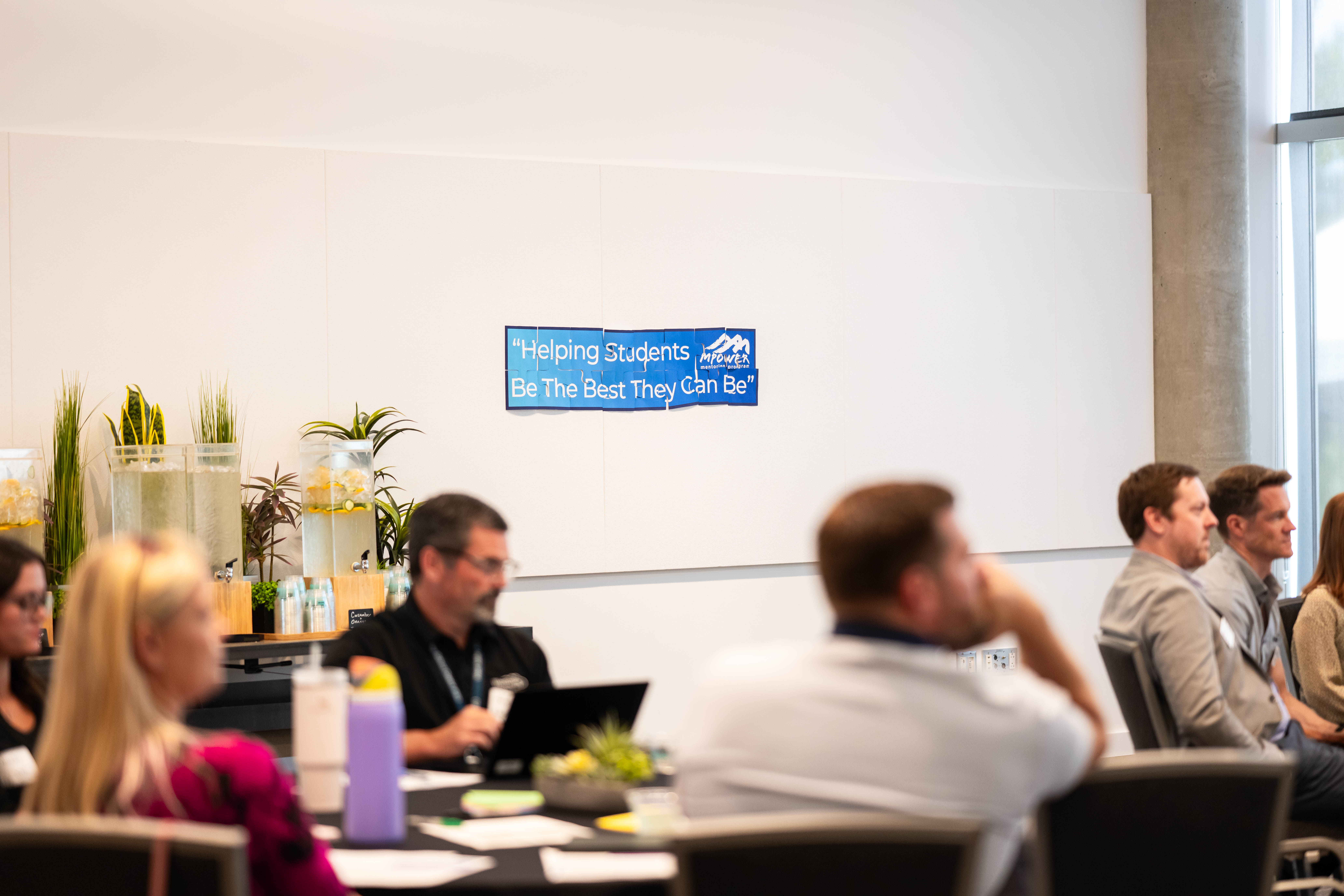
Figurative Arborists Scheme for the Future
Student need for mentoring has never been more desperate. In its first year, Mpower proves it may be the solution.
Community is a dirty word.
It refers to some inextricably bound yet categorically blurred group of people. The messiness of it means that defining who belongs to and represents a community can be challenging. As our understanding of community strains under the murky weight of its own ambiguity, so too can our efforts at strengthening it. Worse still, communities come in all shapes and sizes. They might be constructed around an identity, a location– or in the case of the event I’m at today, a cause.
It’s the Mpower Mentoring Program Kickoff Event: a multi-hour presentation followed by a beautiful patio reception just beyond the glass doors. I’m seated in a conference room packed full of key members in Eastern Washington’s educational and economic systems. They work with my organization, LaunchNW, to address crises in local youth development and career-readiness.
‘Crises’ isn’t hyperbolic, either. The kids aren’t alright: more than 70% of jobs here require some kind of post-high school education, whether that be trade school, four-year college, or more. But over half of local high school grads do not pursue any higher education. If half of the incoming workforce is unable to fill the majority of job opportunities, the consequences for our local economy and quality of life will be dire.
Personally, I’m more concerned with individual wellbeing than the economy, but it’d be silly to pretend that the two aren’t linked in any way. Rather than merely telling kids to study harder, LaunchNW has implemented several initiatives supporting children and their families from birth to career attainment. Chief among them is the Mpower Mentoring Program.
As the presentation begins, the Executive Director of LaunchNW, Ben Small, stands at a modest podium. An expectant silence takes the room.
But my mind is elsewhere, thinking about community again. It just evades conceptualization, more like marketing jargon than a tangible aspect of our lives.
You and I live in the same town. We take the same bus to work every day. I have strong opinions about the food joint a few blocks off Sprague Avenue that you personally love. In short, we have a shared base of experiences and knowledge which ties us together in some way.
So sure, we’re a community. But what does that really mean? I must answer that question—if not for the sake of my job, then to satisfy my own curiosity.
Reality
Ben and the LaunchNW team designed a clever activity for this event. He instructs us to read a sheet at our tables with family cost of living data from the several school districts represented here today, and to estimate an annual income which would enable those families to live comfortably.
It’s a fairly obvious setup, but when folks are handed the accompanying sheet with data on actual family incomes, it makes no less of an impact. The discrepancies between the required annual income and the real median income statistics are huge. How could families survive, let alone thrive, with these financial realities?
Many do not. Some persevere through a brutal combination of overworking, extreme stress, and luck. They shouldn’t have to. Plus, that way of living has its own drawbacks for the whole family, as one attendee points out.
“I’m struck by the thought of what kids who are living this experience when they walk through the doors of our schools. The stress, the pressure, all not because of them, and really in some ways you can’t point the finger at their parents either. But they bring that with them as baggage to school, and then our job is to teach them.”
The attendee’s voice is soft with the weight of responsibility. “I just think about that a lot.”
I resonate with their words. I was one of those students as a homeless youth, living with various family members and roommates while working throughout high school and college. The stress doesn’t leave you.
Despite these grim realities, people look to make change. “Our job doesn’t end after we get them graduated, but our job also somehow has to persist after that,” one educator says.
Stacie Davis, Program Director at Big Brothers Big Sisters of the Inland Northwest, offers helpful perspective, too.
“I think about the number of kids who are coming out of spaces like we’ve identified here, who do go into the trades, who have a program that is nine months or a year. We’re putting them into the world expecting them to behave like fully adjusted adults at the age of 19 with no actual life skills to do so. They’re inept at being able to survive in the world because [they haven’t had] the life skill training. Mentorship addresses that.”
Mpower connects students and families with different kinds of mentors as just one approach in LaunchNW’s multifaceted strategy to support students. Through Mpower, students can connect with peer (high school senior), near-peer (college student), or adult mentors. The latter option can even be tailored to mentorship by an individual from a career field which interests the student.
The final mentoring opportunity entails family-to-family mentoring, designed to guide first-generation students and their families along many of the challenges in higher education attainment which might be unfamiliar to them.
“We don’t know the obstacles that kids are facing unless we have people built into our schools [who] can ask those questions,” says Kyle Rydell, West Valley School District Superintendent.
Of course, schools have counselors and teachers who go out of their way to support children, but many more still go without support despite their commendable efforts. It’s the truth of numbers. There’s not enough mentoring to go around. That’s where Mpower comes in.
The Mpower Advantage
By this time, Mpower has been in action for a full year. Today isn’t just a reassurance of the program’s necessity, but also a celebration of its triumphs thus far and a communal orientation towards furthering its future.
“One of the high points that we had at the end of the year after working with our mentors and mentees was to see a couple of [them] at our Grade Up homework extravaganza,” recalls one attendee.
“These were two kids. One was [a senior] on his way out the door to BYU, and another was a junior who had some struggles throughout school. And just to walk by them and see them sitting together at a table, working together when it wasn’t an actual mentorship event felt like a success, just to know that those two students wouldn’t ever have sat together [otherwise]. It was a great feeling.”

Another person in the room provides a great example of how mentorship expands a student’s support network for success. Their student was an excellent athlete and academic, yet she lacked family support to make decisions about their future.
“She had the option to go to her dream school of Montana Tech with the potential for a track scholarship so long as she hit a certain distance on her throw. But after not hitting that distance, it started to look like she might not achieve that goal.”
The student wrestled with two options: go to her dream school but risk financial burden, or go to a university which would put less strain on her monetarily. It’s a decision too many bright students are faced with. Luckily, this student had some help.
She sat down with several supports, including her adult mentor through Mpower. They helped her to assess and understand the cost and benefit of her options.
“She made a decision to go to Montana Tech even without the scholarship,” says the attendee. “And it turned out that after she committed, they ended up offering her a track scholarship anyways. So hopefully this fall she’ll be throwing for Montana Tech.”
It’s the first of many such success stories at this event. Alexis, a site coordinator at Shadle Park High School, shares another.
After a student’s fruitful connection through Mpower to a salon owner, she had her heart set on attending a cosmetology school in Spokane. But the school closed and the alternative option at SFCC turned out to have a waitlist. The student was discouraged, but Alexis urged her to apply to Eastern Washington University’s business school for classes which would equip her to run her own salon someday.
As she continues speaking, Alexis’ voice begins to swell with emotion.
“She was just kind of like. ‘No, I’m not going to get accepted to college. I don’t want to apply to college. It’s not worth it.’ And I [replied], ‘If we try, the worst that they’ll say is no. Then we know that it’s not an option and we can move on from there.’
And about a week later, she came running into the career center. She was crying, ‘I got accepted! I never thought this would happen.’ She called her whole family while we were sitting there, ‘I got accepted to college! I’m going to college!’ She was so excited.”
The place brightens and bursts with smiling applause. It’s these kinds of stories that everyone in the room lives and works for.

Towards the Future
As the event closes, people rise from their chairs to crowd the gorgeous patio decorated with hanging string bulbs. Beyond some exterior railing, the river bubbles under fickle clouds that dart in and out of the sun. I spot a swathe of trees beyond the far riverbank. They catch my eye for little more than a moment.
I feel simultaneously energized and exhausted by the time everything wraps up. With a twinge of defeat, I realize that I’ve yet to think up an elevator pitch.
But I do know something now after witnessing the passion of those involved in Mpower. There will always be those who coopt progressive language and ideals. Yet there are also those folks who don’t use ‘community’ lightly. Plenty of them attended the Mpower Kickoff.
To them, community can be more than a tagline or buzzword. It’s the unwavering belief that our responsibility in this life doesn’t end with our personal circle of family and friends. It’s the understanding that problems are bigger than individuals, so our solutions to them must be, too.
Some might call such idealism foolish. I’d call it courageous, and in a world blighted here and afar by hunger, poverty, and violence, it’s also increasingly necessary.
‘Community’ isn’t the dirty word I thought it was. If anything, it’s a word I wish I heard more in my daily life. It’s a standard of mutual care and responsibility made important not in spite of our inherent distance, but rather because of it. That such a feeling of community can and does exist for a city of very different people is beautiful. We should not take that for granted.
Seeing those trees across the riverbank reminded me of something. There’s a quote I’ve grown to love from poet and Nobel Prize winner Rabindranath Tagore.
“The one who plants trees, knowing that he will never sit in their shade, has at least started to understand the meaning of life.”
Here at Launch Northwest, I’d like to believe we are planting those trees—and we’re not doing it alone. We have amazing community partners at our side who work with us and offer invaluable perspective on the many backgrounds and identities which comprise the people we serve.
If you’ve read this far and aren’t already connected with us, I’d like to invite you to join in. We can accomplish so much more together than we ever could alone.
Samuel McLaughlin is a Marketing and Communications Program Associate at LaunchNW.
